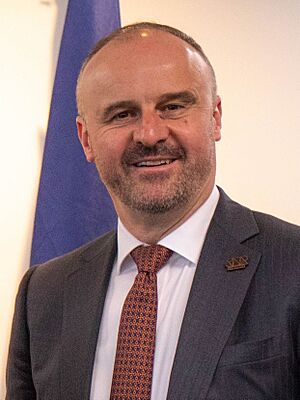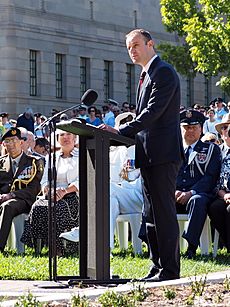Andrew Barr facts for kids
Quick facts for kids
Andrew Barr
MLA
|
|
|---|---|

Barr in 2025
|
|
| 7th Chief Minister of the Australian Capital Territory Elections: 2016, 2020, 2024 |
|
| Assumed office 11 December 2014 |
|
| Deputy | Simon Corbell Yvette Berry |
| Preceded by | Katy Gallagher |
| 11th Deputy Chief Minister of the Australian Capital Territory | |
| In office 16 May 2011 – 11 December 2014 |
|
| Leader | Katy Gallagher |
| Preceded by | Katy Gallagher |
| Succeeded by | Simon Corbell |
| Treasurer of the Australian Capital Territory | |
| In office 1 July 2011 – 8 November 2024 |
|
| Preceded by | Katy Gallagher |
| Succeeded by | Chris Steel |
| Member of the Australian Capital Territory Legislative Assembly for Kurrajong Molonglo (2006–2016) |
|
| Assumed office 5 April 2006 |
|
| Personal details | |
| Born |
Andrew James Barr
29 April 1973 Lismore, New South Wales, Australia |
| Political party | Labor |
| Spouse |
Anthony Toms
(m. 2019) |
| Alma mater | Australian National University |
Andrew James Barr (born 29 April 1973) is an Australian politician. He has been the Chief Minister of the Australian Capital Territory since 2014. This means he is the head of the government for the ACT.
Before becoming Chief Minister, Barr was the Treasurer of the Australian Capital Territory from 2011 to 2024. He has also been the leader of the ACT Labor Party since 2014. He became a member of the ACT Legislative Assembly in 2006. He is the longest-serving Chief Minister in the ACT since it gained self-government in 1989.
Andrew Barr was promoted to a government minister right after he was elected. On 11 December 2014, he was chosen as Chief Minister. This happened after the previous Chief Minister, Katy Gallagher, decided to run for the Australian Senate. Besides being Chief Minister, he also looks after areas like economic development, tourism, and trade.
Andrew Barr was the first openly gay head of government in Australia. He was also the first openly gay member and government minister in the ACT Legislative Assembly, starting in 2006.
Contents
Early Life and Education
Andrew Barr was born in Lismore, New South Wales. He grew up in Canberra. He went to several local schools, including Holt Pre-School and Lyneham High School.
He studied at the Australian National University. There, he learned about political science, economics, and economic history. He earned a Bachelor of Arts degree. During his time at university, he was involved in student politics. He served as Treasurer for the university's student association.
Political Journey
Starting in Politics
After finishing university in 1995, Andrew Barr worked for a federal politician named Annette Ellis. Later, he worked for Jon Stanhope, who was then the ACT Opposition Leader. In 1999, he changed careers and worked in the private sector as a media analyst.
Barr became an important figure in the "right faction" of the ACT Labor Party during the 1990s. He helped elect Michael Kerrisk as the first non-left party secretary for ACT Labor.
Returning to Public Service
Andrew Barr returned to politics in 2002. He became a senior advisor to John Hargreaves. When Hargreaves became a minister in 2004, Barr became his chief of staff. He held this job until he was elected to the Assembly in April 2006.
In 2004, Barr tried to get elected for the Labor Party in the Molonglo electorate. He focused his campaign on topics like managing money, making housing more affordable, and improving city services. He also supported laws for equality and fairness for all people. He did well in the inner-city areas but just missed out on winning a seat.
Barr got another chance to join the Assembly when Treasurer Ted Quinlan resigned in March 2006. A special process called a "countback" was held. This process redistributed Quinlan's votes, and Andrew Barr was then elected to the ACT Legislative Assembly.
When Quinlan resigned, there was a change in government ministers. Barr immediately became a minister. He was given responsibility for education, training, industrial relations, sport, and tourism. In his first speech, he talked mostly about managing the economy, affordable housing, and social reforms.
Barr was re-elected for Molonglo in the 2008 and 2012 ACT elections. After a big change in electorates, he was elected for Kurrajong in the 2016 election and again in 2020.
Leading the ACT Government
After Jon Stanhope resigned in May 2011, Andrew Barr became Deputy Chief Minister under the new Chief Minister, Katy Gallagher. When Gallagher resigned to run for the Australian Senate, Barr was elected as Chief Minister on 11 December 2014.
As leader, Barr guided ACT Labor to win a fifth election in a row in October 2016. Since June 2024, Barr has been the longest-serving Chief Minister of the ACT. He passed Jon Stanhope, who served for about 9.5 years. As of May 2025, Barr is also the longest-serving state or territory leader in Australia.
Improving the Economy and Taxes
In 2012, Andrew Barr announced a 20-year plan to change the ACT's tax system. The goal was to make taxes fairer, simpler, and more effective. This plan included getting rid of stamp duty on property sales and insurance. The money lost from these changes would be made up through general rates. Many economists supported this idea.
As Treasurer and Chief Minister, Barr has focused on growing the ACT's economy. He has encouraged private businesses to invest in higher education, trade, tourism, major events, arts, and sports. Because of this, the ACT's economy and job market have become more diverse. They are less reliant on government jobs.
In 2016, the ACT Government helped bring international flights to Canberra. Singapore Airlines started a route connecting Singapore, Canberra, and Wellington. Qatar Airways also began flights through Sydney. In the same year, Barr created an office to build international relationships. This office helps the ACT with economic, social, and cultural benefits.
In October 2019, Barr launched the ACT Government's Infrastructure Plan. This plan outlined important projects for health, transport, education, and the environment. These included a new hospital, a new stadium, upgrades to the Canberra Institute of Technology (CIT) campus, and the second stage of light rail.
In 2020, Barr announced a big expansion for UNSW Canberra. A new campus was planned for Canberra's city center, on the existing CIT site.
Public Transport
The construction of Canberra's light rail line was part of an agreement. This agreement was made between the previous government and the ACT Greens after the 2012 election. This agreement continued after the 2016 election, which saw the Labor-Greens government return.
In April 2019, Stage 1 of the Canberra light rail opened. It connects Canberra's northern suburbs in Gungahlin with the city center.
In September 2019, the Barr Government approved the plan for Stage 2A of the light rail. This stage will extend the line with three more stops from the city center to Commonwealth Park. This project required raising London Circuit, which began in November 2022.
In October 2024, work started on a new 'MyWay+' ticketing system for all public transport in Canberra. This system was completed in November 2024. It allows for more accurate real-time transport data. It also lets people pay with credit cards, smartphones, and wearable devices.
Clean Energy
Barr's government has continued policies to fight climate change. These policies aim to reduce carbon emissions and use more renewable energy. The ACT Government wants to reduce emissions by 50–60% (from 1990 levels) by 2025. They also aim for net zero emissions by 2045. In May 2019, the ACT declared a state of climate emergency.
In 2020, the ACT became the first major area outside the European Union to get all its electricity from net-zero greenhouse gas sources.
In 2021, the Barr Government started its 'Sustainable Household Scheme'. This scheme offers loans with no interest, up to $15,000. These loans help eligible homes make upgrades like adding rooftop solar panels, battery storage systems, and electric vehicles.
In July 2022, the Barr Government announced plans to ban the sale of new petrol cars in the ACT from 2035. As of 2023, the ACT has the highest number of electric vehicles compared to other Australian states and territories. About 20% of all new car purchases there are electric.
In June 2023, the Barr Government passed a law to ban new gas connections in new buildings in the ACT. This ban started in December 2023.
Recycling and Circular Economy
The Barr government has promoted ideas for a circular economy. This is part of its 'Everyday climate choices' campaign. A circular economy aims to reduce waste by reusing and recycling materials.
In June 2018, the Barr government launched a container deposit scheme. This scheme encourages people to return empty drink containers for a small refund. It is estimated that in its first four years, 300 million containers were recycled.
In April 2019, the Barr government finished rolling out green bins for vegetation waste to all Canberra suburbs. In November 2021, they started a trial program for collecting food and garden organics (FOGO) in some suburbs. This program was expanded to more suburbs in September 2024.
Since 2021, the Barr government has also gradually increased restrictions on single-use plastics. As of 2024, these restrictions apply to items like plastic cutlery, stirrers, straws, polystyrene takeaway containers, non-compostable coffee cups, heavy plastic bags, and degradable plastic.
Assisted Dying Legislation
In December 2022, the federal Australian Parliament removed a ban. This allowed the ACT and Northern Territory to create their own laws about assisted dying. Following this, in June 2024, the Barr government passed a law in the ACT Parliament. This law makes assisted dying legal for adults in the ACT who have a serious, progressive illness that is expected to cause death. This law will come into effect in November 2025.
Supporting Equality
Andrew Barr has been a strong supporter of equal rights for all people. He has voted in favor of laws that prevent discrimination and promote fairness.
His government has continued to support anti-discrimination and inclusion for diverse communities. In 2017, Barr was a strong supporter of the 'Yes' campaign in the Australian Marriage Law Postal Survey. This was a public vote on whether marriage laws should be changed to include all couples. The ACT had the highest 'Yes' vote (74%) and participation rate (82.5%) in Australia. The ACT Government officially supported the "Yes" campaign.
In 2018, his government announced plans to remove the ability for religious schools to treat teachers differently based on their identity.
In 2020, the Barr government passed a law that bans practices aimed at changing a person's sexual orientation or gender identity.
Personal Life
Andrew Barr married his long-term partner, Anthony Toms, on 13 November 2019. He became the first leader of an Australian state or territory government to marry someone of the same sex.
See also
- List of openly LGBT heads of government
- List of LGBTI holders of political offices in Australia
- 2020 Australian Capital Territory election
 | Jessica Watkins |
 | Robert Henry Lawrence Jr. |
 | Mae Jemison |
 | Sian Proctor |
 | Guion Bluford |


